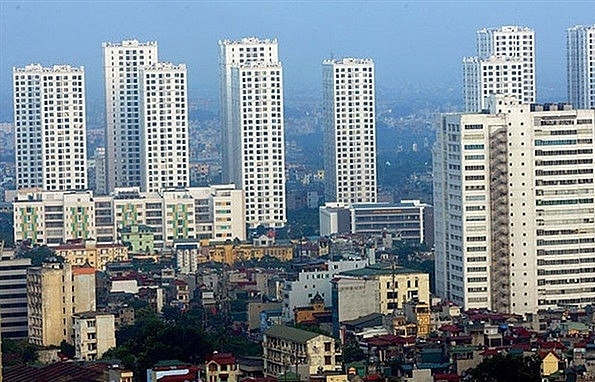The field of real estate has a great impact, many technical contents require the participation of many ministries and local branches. Therefore, the tax policy for real estate needs to be studied and evaluated carefully before submitting to the competent authorities for promulgation at an appropriate time to ensure feasibility, high consensus, and contribute to limiting investment real estate agencies.
This is an opinion made by the Ministry of Finance on the afternoon of May 4 on the issue of adjusting tax policies, contributing to improving the efficiency of state management of the real estate.

The proposal to adjust taxes on real estate
Previously, the Ho Chi Minh City Real Estate Association (HoREA) had an opinion: In order to reduce house prices, the State needs to change the way of collecting land use fees for commercial housing projects, turning it into a tax on the act of changing the use purpose. land from agricultural and non-agricultural land to residential land, with the tax rate possibly equal to about 15-20% of the land price in the land price list. At the same time, in order to make up for the shortfall in state budget revenue and create a stable and sustainable source of revenue for the state budget, it is necessary to tax real estate.
Responding to the above views, the Ministry of Finance said that the current system of tax policies, fees, and charges for real estate is quite complete, including Agricultural land use tax; non-agricultural land use tax; income tax on real estate transfer; registration fees and other related fees and charges (such as fees for granting certificates of land use rights, ownership of houses and other assets attached to land…).
The Ministry of Finance believes that these revenue policies have fully covered the process of forming, owning, using, and transferring real estate, gradually being perfected, contributing to encouraging organizations and individuals to use real estate. thriftily, effectively, gradually limiting real estate speculation and wasteful use of land.
In order to contribute to improving the efficiency of state management of the real estate, it is necessary to study and perfect relevant tax policies. However, this is an area of great impact, with many technical contents requiring the participation of many ministries and local branches, so it needs to be researched and evaluated thoroughly before submitting for approval. authority to issue at an appropriate time to ensure feasibility, high consensus, contributing to limiting real estate speculation.
Following the direction of the Prime Minister, the Ministry of Finance is continuing to study and synthesize international experiences, identify problems and inadequacies in the implementation of tax laws related to real estate to report to the Government and submit it to the National Assembly at an appropriate time in association with the formulation and implementation of the Tax System Reform Strategy for the 2021-2030 period.
The real estate transfer tax
There are some opinions that: “In addition to contributing to the budget, the tax policy must achieve the goal of regulating, orienting consumption and anti-speculation, but with the current collection method, the real estate transfer tax has not yet reached the target. The essence of real estate transfer tax is a direct tax and must be collected on the “land rent difference”, which is the profit earned by the investor. However, at present, the tax agency’s method of collection is “deferred tax”, for every 2% of the transfer price, any profit or loss must also be taxed. This method of collection is easy for tax authorities but it “distorts” the policy.
According to the Ministry of Finance, previously, the Personal Income Tax Law No. 04/2007/QH12 stipulates that individuals earning income from real estate transfer shall pay tax at the tax rate of 25% on income (transfer price minus purchase price and tax rate). related costs). In case the purchase price and related expenses cannot be determined, tax at the rate of 2% of the transfer price shall be paid.
The Ministry of Finance said that in practice, there were many problems such as no grounds to determine the purchase price and related costs of real estate transfer activities, especially for long-established real estate. have documents and grounds to prove the cost of the real estate, given, donated or inherited. The transfer between individuals in cash is difficult to control; There are cases where tax is paid at the tax rate of 2% and then re-declared at the tax rate of 25% for tax refund, or tax authorities require individuals to re-declare it at the 25% tax rate to collect tax arrears, causing lawsuits…
From January 1, 2015, Law No. 71/2014/QH13 amending and supplementing a number of articles in the tax laws stipulating that individuals transferring real estate pay 2% tax on the real estate transfer price. The regulation of a tax calculation method ensures transparency in policies, avoids obstacles in implementation and reform of administrative procedures.
Particularly for enterprises engaged in real estate transfer, the cost of real estate shall be determined according to the enterprise’s accounting books.
The Law on Corporate Income Tax stipulates that enterprises earning income from real estate transfer shall pay tax at the tax rate of 20% on income. Taxable income from real estate transfer is determined by revenue from real estate transfer activities minus the cost price of real estate and deductible expenses related to real estate transfer.
ASL LAW is the top tier Real Estate law firm in Vietnam for. If you need any advice, please contact us for further information or collaboration.

 Tiếng Việt
Tiếng Việt 中文 (中国)
中文 (中国)
